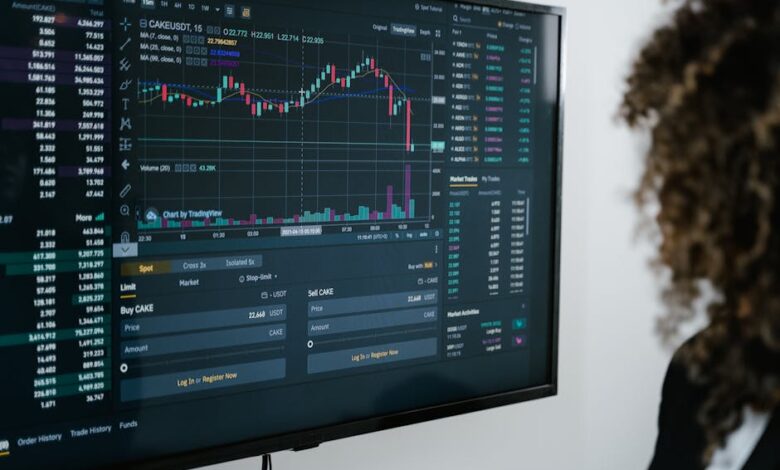Navigating the Future: The Intersection of AI, Blockchain, Quantum Computing, and Technology in Transforming Finance and Beyond

In an era marked by rapid technological advancement, the intersection of innovation and industry has never been more pronounced. As we navigate the complexities of the 21st century, artificial intelligence (AI) stands out as a transformative force, reshaping financial services and revolutionizing how we manage our resources. Coupled with the groundbreaking potential of blockchain technology, AI is not only enhancing efficiency within finance but also redefining the parameters of trust and security across various sectors. Beyond these two pillars, the emergence of quantum computing promises to revolutionize cybersecurity, presenting both unprecedented capabilities and new challenges. Innovations in fintech, from digital wallets to robo-advisors, are further enhancing consumer experiences, while the anticipated rollout of 5G technology holds the key to seamless global connectivity. However, with these advancements come significant ethical dilemmas, particularly regarding the implications of AI and automation on society. This article explores these dynamic trends, examining how emerging technologies are driving sustainability, shaping decision-making through big data, and ultimately transforming our world in profound ways. Join us as we delve into the future of finance and beyond, highlighting the pivotal role of technology in shaping a more interconnected and sustainable society.
- 1. **Transforming Finance: The Impact of AI and Blockchain on Financial Services**
- 2. **Beyond the Ledger: How Blockchain is Redefining Industries Across the Board**
- 3. **Quantum Leap: The Future of Cybersecurity in an Age of Quantum Computing**
1. **Transforming Finance: The Impact of AI and Blockchain on Financial Services**
The financial services industry is undergoing a significant transformation driven by the integration of artificial intelligence (AI) and blockchain technology. AI enhances decision-making processes, automates routine tasks, and improves customer service through intelligent chatbots and personalized financial advice. Machine learning algorithms analyze vast amounts of data to identify patterns, detect fraud, and assess credit risks more accurately than traditional methods. This shift not only streamlines operations but also allows financial institutions to offer tailored products and services to meet the unique needs of their clients.
On the other hand, blockchain technology introduces a new paradigm of transparency, security, and efficiency in transactions. By enabling decentralized and immutable ledgers, blockchain reduces the need for intermediaries, thereby lowering transaction costs and speeding up settlement times. This is particularly beneficial in cross-border transactions, where traditional banking systems often encounter delays and high fees. Additionally, smart contracts—self-executing contracts with the terms of the agreement directly written into code—further automate and secure processes by ensuring that contractual obligations are fulfilled without the need for manual oversight.
Together, AI and blockchain are not only reshaping the operational landscape of financial services but also enhancing trust among stakeholders. Clients are more assured of their data security and the integrity of transactions, while institutions can leverage these technologies to comply with regulatory requirements more efficiently. As these innovations continue to evolve, they promise to create a more agile, transparent, and customer-centric financial ecosystem that can adapt to the rapidly changing global market.
2. **Beyond the Ledger: How Blockchain is Redefining Industries Across the Board**
Blockchain technology, initially developed as the backbone of cryptocurrencies, is now making significant strides beyond finance, redefining how various industries operate. Its decentralized, transparent, and secure nature has led to innovative applications in sectors such as supply chain management, healthcare, and real estate.
In supply chain management, blockchain enhances traceability and accountability. By providing an immutable record of transactions, it allows all parties involved—from manufacturers to consumers—to verify the authenticity and origin of products. This transparency helps combat fraud and counterfeiting, while also improving efficiency by streamlining processes and reducing paperwork.
Healthcare is another industry experiencing a transformative impact from blockchain. Patient records can be securely stored and shared across different healthcare providers, ensuring that medical histories are accurate and easily accessible. This not only improves patient care but also enhances data security, as blockchain's encryption makes unauthorized access nearly impossible. Furthermore, blockchain can facilitate drug traceability, helping to prevent the distribution of counterfeit medications.
In real estate, blockchain simplifies property transactions by enabling smart contracts—self-executing contracts with the terms directly written into code. This reduces the need for intermediaries, such as brokers and lawyers, thus lowering transaction costs and increasing efficiency. Additionally, blockchain can provide a transparent history of property ownership, making it easier to resolve disputes and verify titles.
Beyond these applications, blockchain's potential extends to areas like voting systems, identity management, and intellectual property protection. By fostering trust and reducing the need for intermediaries, blockchain technology is poised to redefine how industries operate, driving efficiencies and enhancing security across a wide array of sectors. As adoption continues to grow, the possibilities for innovation remain vast, making blockchain a key player in the evolution of modern business practices.
3. **Quantum Leap: The Future of Cybersecurity in an Age of Quantum Computing**
As quantum computing continues to advance, its potential to transform various sectors, particularly cybersecurity, is becoming increasingly evident. Traditional encryption methods—such as RSA and ECC—rely on the complexity of mathematical problems that current classical computers struggle to solve. However, quantum computers leverage qubits and quantum algorithms, such as Shor's algorithm, which can factor large numbers exponentially faster than classical counterparts. This capability poses a significant threat to existing encryption standards, potentially rendering them obsolete and exposing sensitive data to unprecedented risks.
In response, the field of quantum-safe cryptography is emerging, focused on developing new algorithms designed to withstand the computational power of quantum systems. These algorithms aim to protect data integrity and confidentiality in a post-quantum world. Initiatives from organizations like the National Institute of Standards and Technology (NIST) are already underway to standardize quantum-resistant algorithms, ensuring that data security evolves alongside technological advancements.
Moreover, quantum computing has the potential to enhance cybersecurity measures. Quantum key distribution (QKD) utilizes the principles of quantum mechanics to create secure communication channels, making it virtually impossible for eavesdroppers to intercept information without detection. By implementing QKD and other quantum-enhanced security protocols, organizations can bolster their defenses against cyber threats.
As we move toward a future where quantum computing becomes more prevalent, the cybersecurity landscape will need to adapt rapidly. Businesses and governments must prioritize investments in quantum-safe technologies and strategies to safeguard their data assets. Understanding the implications of quantum advancements is essential for maintaining security in an increasingly interconnected world, where the stakes of data integrity are higher than ever. By proactively addressing these challenges, we can harness the benefits of quantum computing while mitigating its risks to cybersecurity.
In conclusion, the landscape of financial services and beyond is undergoing a profound transformation driven by emergent technologies. Artificial intelligence is not only enhancing operational efficiency and customer experience within finance but is also paving the way for innovative solutions like robo-advisors and digital wallets. Meanwhile, blockchain technology is proving its versatility by redefining not just finance but also various other sectors, demonstrating its potential to enhance transparency and security across industries. The advent of quantum computing introduces both exciting prospects and significant challenges, particularly in the realm of cybersecurity, necessitating a reevaluation of our current security protocols.
As we transition into an era of 5G technology, global connectivity will reach unprecedented levels, fostering a new wave of innovation and collaboration. Coupled with the power of big data, businesses can make more informed decisions, driving efficiency and growth. However, these advancements also bring ethical challenges, particularly concerning AI and automation, which require careful consideration to ensure that technology serves humanity rather than undermines it.
Finally, the role of technology in promoting sustainability and green energy solutions highlights the potential for these innovations to contribute positively to global challenges. As we continue to explore the intersections of technology and society, it is imperative to embrace these advancements responsibly, ensuring they benefit all and contribute to a sustainable future. The journey ahead is one of both promise and responsibility, inviting us to navigate the complexities of innovation with a vision for a better world.






